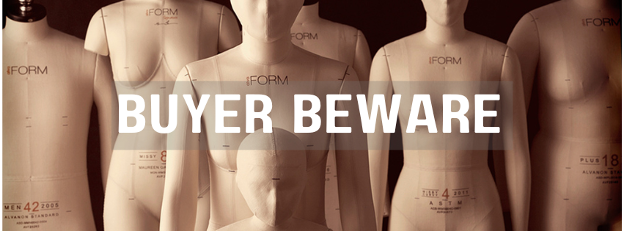

View University of Fashion’s Introduction to Dress Forms lesson before purchasing a dress form.
With the holidays right around the corner, are you looking for a unique gift for that fav fashionista in your life? Thinking of purchasing her/him/them a dress form? Or, how about one for yourself? Stop! Before you do, you must be in the ‘know’, otherwise you are just going to be wasting your money.
This is why we have a whole lesson, Introduction to Dress Forms, on choosing and purchasing a dress form that covers the entire gamut: from how they are made, to what to look for, and how to choose a dress form depending on its end use. For example, if your dress form will be used for draping, a papier-mache construction with padding is a must!
A ‘Direct Pinnable’ dress form is used for draping vs a ‘Partially Pinnable’ dress form is used for display purposes.
For example, is the dress form going to be used for draping? If so, you will need a ‘direct pinnable’ model, since pins will need to be inserted directly into the form and not at an angle.
Other important dress form characteristics to look for are whether the dress form is adjustable and has locking wheels. This will make it easier for you to raise and lower the form, roll it, and to lock it into place.
Another set of features to look for are: adjustable shoulders so that you can remove the drape from the dress form easily, detachable shoulder caps, detachable arms and collapsible hips on a bifurcated pant form.
Some dress forms feature detachable, flexible arms.
Other features include detachable legs, calves and feet.
There are even dress forms specific to the maternity trade!
Certain types of dress forms are made for specific garment categories like sportswear, bridal and swimwear.
Our lesson covers the names of the various types of dress forms: full body, half body, full torso, lower torso, upper torso and slacks (bifurcated) form.
Dress forms are made to service the men’s, women’s and children’s fashion industry as well as the plus-size, swimwear and lingerie markets.
Our lesson also covers dress form terminology and how to identify center measuring points on a dress form.
Depending on your budget, there is definitely a dress form out there for you, just be sure to view our video before you purchase one. Alvanon, maker of AlvaForm, makes some of the best dress forms in the industry. Their forms are prominently featured in many of University of Fashion’s lessons.
Another top-notch dress form company is Stockman. Their forms have been are handcrafted in a workshop near Paris since 1867, and are used at the world’s couture houses, Dior, Chanel, Louis Vuitton, Celine, Rabanne, Prada, Loro Piana and at many other top brands.
So, once you have viewed our Introduction to Dress Forms lesson and chosen your dress form wisely, we wish you many happy hours of creativity. Your dress form will bear the imprints of past creations, every pinhole and seam a testament to your relentless pursuit of perfection.
Happy Creating!





